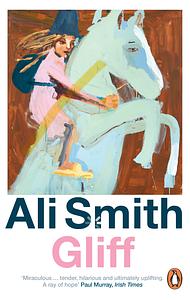Take a photo of a barcode or cover
mysterious
reflective
medium-paced
Plot or Character Driven:
Character
Strong character development:
Complicated
Loveable characters:
No
Diverse cast of characters:
No
Flaws of characters a main focus:
Complicated
adventurous
dark
emotional
fast-paced
Plot or Character Driven:
Character
Strong character development:
Yes
Loveable characters:
Yes
Diverse cast of characters:
Yes
Flaws of characters a main focus:
Yes
medium-paced
BOOK REVIEW: GLIFF BY ALI SMITH
Having previously read Autumn and Winter from Ali Smith’s Seasonal Quartet, I was eager to explore Gliff. This novel, set in a dystopian future under authoritarian rule, is philosophical and thought-provoking. At its heart, it's the story of two siblings—Briar and Rose.
A striking element of the book is how the author deliberately withholds Briar’s gender. Briar, a teenager with no defined gender, represents identity fluidity and resists categorisation—challenging systems that demand verification and labels.
I found Rose, the younger sister, incredibly charming and intelligent. Her dialogues were particularly enjoyable. Here's a snippet of a humorous exchange between the siblings and their neighbour:
IS YOUR NAME REALLY COLON? I SAID.
HE SPELLED IT. IT REALLY WAS.
WHO CALLED YOU THAT?
EVERYONE CALLS ME IT. MY FATHER. MY BROTHER.
HAVE YOU GOT A LITTLE BROTHER CALLED SEMI? MY SISTER SAID.
OR ARE YOU NAMED AFTER AN ANCESTOR’S INTESTINES?
HE LOOKED BEWILDERED.
IS YOUR SECOND NAME IZATION? MY SISTER SAID.
I LAUGHED. I COULDN’T NOT.
Isn’t that just adorable and funny?
The novel is rich with symbolism. Rose discovers a horse destined for slaughter and names it Gliff. The horse seems to represent freedom—free from labels and systems. Interestingly, people not recorded in government databases are called “unverifiables.” Before reading, I looked up the word “gliff,” a Scottish term with various meanings, including a glimpse or a fleeting moment. In the book, it becomes a metaphor—an image that defies fixed interpretation.
The novel draws comparisons to Orwell’s 1984, with its themes of surveillance and obsession with verification, and Atwood’s The Handmaid’s Tale, where control is enforced through language and ideology. One chilling element is a device called "the Educator," worn by Colon, which monitors his every move—stifling any chance of independent thought.
Smith also plays with language in fascinating ways. Several chapter titles are clever variations of the phrase from Aldous Huxley’s Brave New World—such as Brave New Old, Rave New Old, Brave Old World, Brave New Word, and more. These playful twists highlight the novel’s core themes: resistance to fixed meaning, rejection of rigid identities, and the subversion of oppressive narratives.
As a fan of dystopian fiction, I thoroughly enjoyed Gliff. A sequel titled Glyph is expected this September, and I’m looking forward to it.
Could this be included on the Booker Prize longlist?
Having previously read Autumn and Winter from Ali Smith’s Seasonal Quartet, I was eager to explore Gliff. This novel, set in a dystopian future under authoritarian rule, is philosophical and thought-provoking. At its heart, it's the story of two siblings—Briar and Rose.
A striking element of the book is how the author deliberately withholds Briar’s gender. Briar, a teenager with no defined gender, represents identity fluidity and resists categorisation—challenging systems that demand verification and labels.
I found Rose, the younger sister, incredibly charming and intelligent. Her dialogues were particularly enjoyable. Here's a snippet of a humorous exchange between the siblings and their neighbour:
IS YOUR NAME REALLY COLON? I SAID.
HE SPELLED IT. IT REALLY WAS.
WHO CALLED YOU THAT?
EVERYONE CALLS ME IT. MY FATHER. MY BROTHER.
HAVE YOU GOT A LITTLE BROTHER CALLED SEMI? MY SISTER SAID.
OR ARE YOU NAMED AFTER AN ANCESTOR’S INTESTINES?
HE LOOKED BEWILDERED.
IS YOUR SECOND NAME IZATION? MY SISTER SAID.
I LAUGHED. I COULDN’T NOT.
Isn’t that just adorable and funny?
The novel is rich with symbolism. Rose discovers a horse destined for slaughter and names it Gliff. The horse seems to represent freedom—free from labels and systems. Interestingly, people not recorded in government databases are called “unverifiables.” Before reading, I looked up the word “gliff,” a Scottish term with various meanings, including a glimpse or a fleeting moment. In the book, it becomes a metaphor—an image that defies fixed interpretation.
The novel draws comparisons to Orwell’s 1984, with its themes of surveillance and obsession with verification, and Atwood’s The Handmaid’s Tale, where control is enforced through language and ideology. One chilling element is a device called "the Educator," worn by Colon, which monitors his every move—stifling any chance of independent thought.
Smith also plays with language in fascinating ways. Several chapter titles are clever variations of the phrase from Aldous Huxley’s Brave New World—such as Brave New Old, Rave New Old, Brave Old World, Brave New Word, and more. These playful twists highlight the novel’s core themes: resistance to fixed meaning, rejection of rigid identities, and the subversion of oppressive narratives.
As a fan of dystopian fiction, I thoroughly enjoyed Gliff. A sequel titled Glyph is expected this September, and I’m looking forward to it.
Could this be included on the Booker Prize longlist?
adventurous
mysterious
There’s a lot of word play here. I wasn’t really sure what I was reading most of the time, but it was intriguing. This novel is like abstract art. I’m looking forward to the next book.
challenging
dark
reflective
medium-paced
Plot or Character Driven:
A mix
Strong character development:
Complicated
Loveable characters:
Yes
Diverse cast of characters:
Complicated
Flaws of characters a main focus:
Complicated
It may just be me being a bit thick but I didn't really get this book at all. Reached the end not knowing the what's why's or wherefores of anything.
challenging
dark
reflective
sad
slow-paced
Plot or Character Driven:
Character
Strong character development:
Yes
Loveable characters:
Yes
Diverse cast of characters:
No
Flaws of characters a main focus:
No
adventurous
dark
emotional
mysterious
fast-paced
Plot or Character Driven:
A mix
Strong character development:
Yes
Loveable characters:
Yes
Diverse cast of characters:
Yes
Flaws of characters a main focus:
Complicated
after 30 minutes, still not interested.



